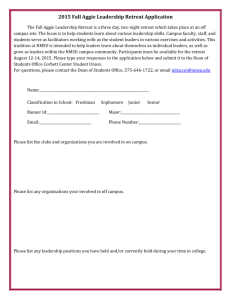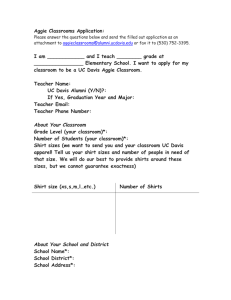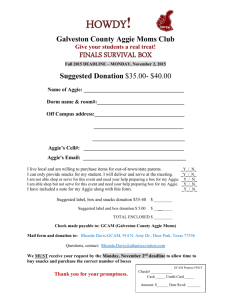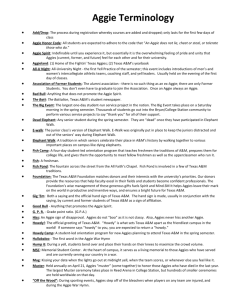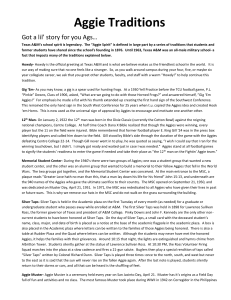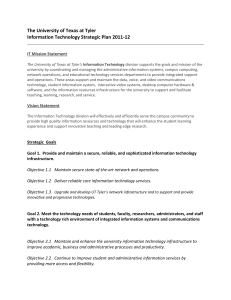Here
advertisement
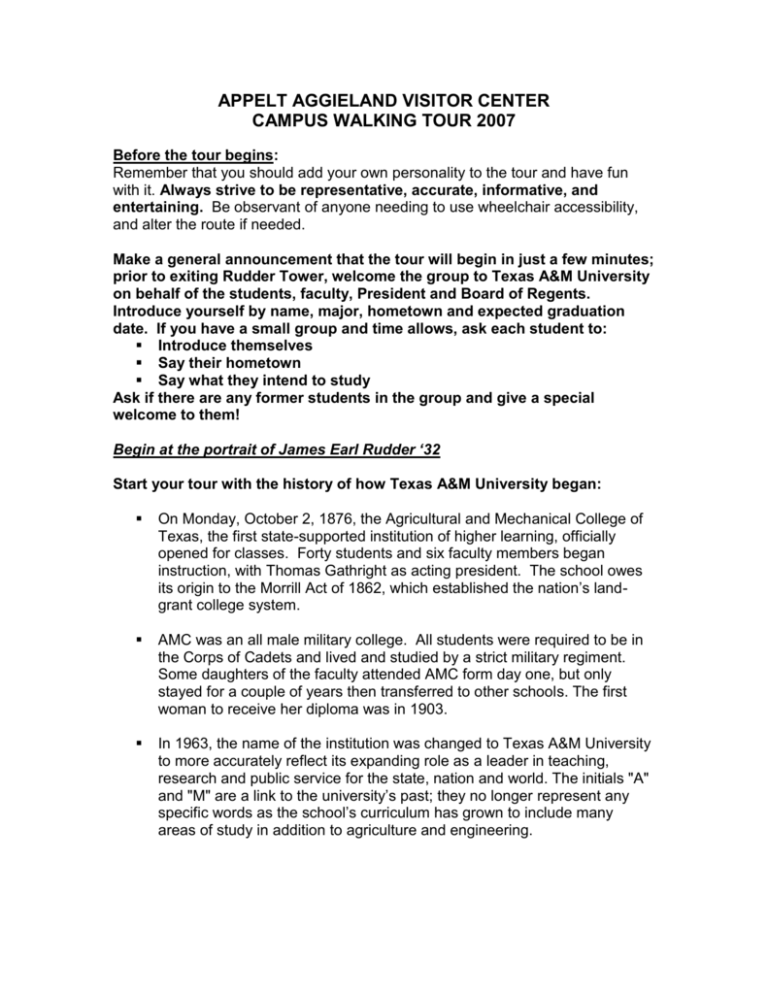
APPELT AGGIELAND VISITOR CENTER CAMPUS WALKING TOUR 2007 Before the tour begins: Remember that you should add your own personality to the tour and have fun with it. Always strive to be representative, accurate, informative, and entertaining. Be observant of anyone needing to use wheelchair accessibility, and alter the route if needed. Make a general announcement that the tour will begin in just a few minutes; prior to exiting Rudder Tower, welcome the group to Texas A&M University on behalf of the students, faculty, President and Board of Regents. Introduce yourself by name, major, hometown and expected graduation date. If you have a small group and time allows, ask each student to: Introduce themselves Say their hometown Say what they intend to study Ask if there are any former students in the group and give a special welcome to them! Begin at the portrait of James Earl Rudder ‘32 Start your tour with the history of how Texas A&M University began: On Monday, October 2, 1876, the Agricultural and Mechanical College of Texas, the first state-supported institution of higher learning, officially opened for classes. Forty students and six faculty members began instruction, with Thomas Gathright as acting president. The school owes its origin to the Morrill Act of 1862, which established the nation’s landgrant college system. AMC was an all male military college. All students were required to be in the Corps of Cadets and lived and studied by a strict military regiment. Some daughters of the faculty attended AMC form day one, but only stayed for a couple of years then transferred to other schools. The first woman to receive her diploma was in 1903. In 1963, the name of the institution was changed to Texas A&M University to more accurately reflect its expanding role as a leader in teaching, research and public service for the state, nation and world. The initials "A" and "M" are a link to the university’s past; they no longer represent any specific words as the school’s curriculum has grown to include many areas of study in addition to agriculture and engineering. Explain the significance of James Earl Rudder ’32 and the Rudder Complex General James Earl Rudder '32 During the D-Day assault in WW II, he led the men of the 2nd Ranger Battalion up the hundred foot cliffs at Pointe du Hoc, France, against heavy German resistance. A&M President from 1959-1970 Corps of Cadets was made non-mandatory in Fall 1965 Women began to be admitted in fall of 1964 (if asked, minorities were officially admitted full-time in the summer of 1963 though some had been attending for many years prior) Rudder Complex Auditorium, Theater, Forum: throughout the years the university has hosted plays, operas, performing arts and world famous speakers. Some of the famous speakers have been Maya Angelou, Steven Hawking (a world-famous physicists), Ted Kennedy, Arnold Schwarzenegger, President George Bush ’41, and Rudolf Giuliani. Explain MSC OPAS (Opera and Performing Arts Society) the types of entertainment they help bring to campus, including famous Broadway plays. Tower consists of: 3rd-7th floors: conference rooms, 8th- 10th floors: Offices of the President and Vice Presidents of the University and 11th floor: Faculty Club which is available to only faculty and staff of the university. Exit side towers of Rudder Complex toward military walk and move to the right next to Hart Hall. Mention A&M facts: Texas A&M University offers degrees in 150 courses of study in 10 different colleges 80% of faculty has earned doctorates, 2,500 faculty complete $550 million in research projects annually Faculty Awards: 2 Nobel Prizes (Dr. Borlaug won the Peace Prize-also recently awarded a National Medal of Science, Dr. Kirby won the Physics Prize) 300 professors hold endowed professorships or chairs We have the largest campus in the country at over 5,200 acres and a little over a 150 buildings. Explain how students get around on campus: walk, ride bikes, ride the different shuttle routes (both on and off campus). World Wide Influence Research conducted on every continent We operate a study center in Santa Chiara, Italy, and Mexico City We have an engineering branch in Doha, Qatar which opened in 2003 Bizzell Hall Home of the Study Abroad Office – they offer 100 different group programs with global opportunities like internships, language institutes, and field studies in over 43 countries o 25% of Aggie graduates had an international experience while at A&M o Students can earn academic credit while studying abroad and have access to over $300,000 in scholarships The International Student Services offices are in this building providing a large array of services to students from all over the world Home of Marketing and Communications Walk past Hart Hall (mention that it is a one of the co-ed dorms;) Veer right on the sidewalk and stop by the large tree on the sidewalk. This gives visitors a view of the Interdisciplinary Life Sciences Building. Continue walking past Hart Hall to Nagle Hall then turn right. Interdisciplinary Life Sciences Building $95 million building with plans to be completed in summer of 2008 220,000-square foot building, the largest construction project in the university's 130-year history, will be equipped with the most modern classrooms and laboratories available Classes will range from Chemistry, Agriculture, to Engineering Leadership in Energy and Environmental Design (or LEED) certified Building program The university is currently investing in a $500 million building program that will be among the most extensive in the country. In addition to the new $95 million interdisciplinary life sciences building, two new physics buildings totaling $57 million, made possible by a major gift by George P. and Cynthia Mitchell of Houston, are currently in under construction New indoor practice facilities for football and track; expansion to Reed Arena All Faiths Chapel Different denominations hold services throughout the year It is open 24 hours a day, 365 days a year Sbisa Dining Hall The main dining hall for students Named after Bernard Sbisa, the Austrian born New Orleans chef who joined the staff in 1879. In his 49 years of service to the students of A&M, only one meal was served late, breakfast on Nov. 11, 1911 because the earlier wooden mess hall burned down early that morning. He used Army field kitchens and had breakfast ready by 10am It features all you can eat buffet of contemporary American, Mexican, Asian and Italian cuisine, a large salad bar and a make your own burger station Take the middle sidewalk to Sul Ross statue. AP Beutel (pronounced Boy-tel) Health Center (do not refer to the Center as the "Quack Shack") It has 10 full-time staff physicians and a pharmacy with discounted medicine for students that offers most services (other than major surgery) Students have unlimited free visits as part of the student health fee Offers discounted prescriptions for students and a “Dial a Nurse” hotline It has a Volunteer Student EMS Program. Stop in front of the Sul Ross statue. Muster This ceremony is held on April 21 of each year. If any Aggie is within 100 miles of another, they are to get together on this day to remember their time at A&M There are over 400 Aggie Musters held worldwide. The 50th class reunion is always held on campus for Muster It is a reunion of spirits and a remembrance of those who have died in the past year. A "Roll Call for the Absent" is called in which a friend, a family member, or another Aggie answers "Here" to signify that although that person is not here in body, he or she is here in spirit Muster is more than a ceremony; it is a way for Aggies to renew, each year, our loyalty and unity, which constitutes the basic foundation of our friendship for each other and love and devotion for our school Silver Taps Any current, graduate or undergraduate student who has died in the previous month is honored Silver Taps is held on the first Tuesday of every month when necessary o At 10:00 p.m. all lights on camps are extinguished o At 10:15 p.m. the Albritton Bell Tower rings o At 10:30 p.m. the student body gathers in the Academic Plaza o The Ross Volunteers march in a slow cadence from the north and fire a 21-gun salute in honor of the deceased o Six buglers are stationed on the rotunda of the Academic Building and play a special rendition of Taps called "Silver Taps" three times (north, south, & west) This is one of our ways of showing that once an Aggie, always an Aggie Lawrence Sullivan Ross Students call him "Sully" He was a Texas Ranger, former Governor of Texas and former president of A&M College Is known for leading A&M "from a state of failure to a growing and prosperous institution" During his presidency, the Aggie Ring was designed, the Fightin’ Texas Aggie Band was formed and intercollegiate football was brought to campus It is said to be good luck to put pennies at Sully's feet Move into the Academic Building through the front, main entrance (enter via the ramp on the right hand side if needing accessibility ramp); point out water fountain if needed. Academic Building The dome of the building is copper, and it has never been polished. There is a story that says cadets use to polish the dome, but they had to stop because the glare would blind pilots flying into Easterwood Airport. This is not true. Built in 1912 after the Old Main building (originally the center of campus) burned down Built through the influence of E. B. Cushing who was president of the board and guaranteed the bonds for construction Had to meet two requirements: be fire proof and stand for at least 50 years One of the first buildings to be built with reinforced concrete and steel beam construction Replica of the Liberty Bell hangs in the center of the dome: each state has a replica given to them as a memorial for WW II. Governor Shivers, the governor of Texas at the time gave this one to Texas A&M in honor of the sacrifices Aggies made during the war. He said, “No one has suffered more than the Aggies, so we will give it to them.” The seal in the center of the building was a gift by the class of 1978, an example of the importance Aggies place on giving back to our country, state, and university The Academic Building currently houses the Honors Program Office, Modern Languages, Office of Professional School Advising, Women’s Studies, and Sociology Move out of the Academic Building back through the main entrance and head down the ramp on your right hand side move down the ramp and stop at the end of the ramp in the shaded area next to the Century Tree. Explain importance of giving at A&M Texas A&M gives back to our country by training and educating officers that serve in the military and in the state through holding governmental positions. Our alumni give millions back to the university through the Association of Former Students. These funds help current students through educational scholarships (A common misconception: the Association does not pay for any portion of a student’s Aggie ring). Current students give back in numerous ways such as ‘The Big Event,’ the largest one day community service event in the country Century Tree Oak tree that is believed to be about 100 years old Tradition holds that Aggies propose to their beloved under the arch of this tree Move East toward the side entrance of the Harrington Education Center Complex (accessibility ramp located at the entrance in between Harrington Tower and Harrington Lecture Hall); point out the Engineering section of campus as you move toward Harrington. Campus Safety A&M is perennially ranked as one of the nation’s safest campuses. The Corps of Cadets offers an escort service; they will send a uniformed cadet with a walkie-talkie to the location of the student calling and walk them to their next location. A&M is ranked the safest campus in the state because of the corps escort service ID cards are required to get into Residence Halls Emergency Phone System (there is one located on the visitor right) Code Maroon is a campus emergency notification service that gives Texas A&M the ability to communicate health and safety emergency information quickly—by email and text message. By enrolling in Code Maroon, university officials can quickly pass on safety-related information to students, regardless of their location. Move into the Harrington Building; point out water fountain availability. Enter classroom 108 or 110 if available and have guests be seated (time permitting/group size allows). Harrington Education Center Complex Largest classroom in here seats 250; smallest seats 30 Largest classroom on campus seats 450 in the Ray Auditorium in the Wehner Building Explain a typical class format Professors give their contact information and have office hours Explain TA’s and SI’s Many professors put their lector notes, outlines, or slides on line to print before going to class. Some will also record audio and/or video, podcast of their lectures for students who are enrolled via distance or who missed class. Encourage visitors to check-out all of the university information available on iTunesU, including prospective student information Move out of the Harrington Building through the same entrance and turn left, walking past Cushing Library. Turn left and head toward Pavilion. Cushing Library Campus Archives, rare books, manuscripts, some artwork Restored in 1998 Sterling C. Evans Library 6 stories, walkway connects 4th floor of main library to the annex Private and group study rooms available Help Desk is located in the back Student Writing Center is located here: services include proof reading papers, resumes, applications, etc. and is included in student fees Library Annex Resources include media services, audio/video resources that students can check out and some book collections Study rooms Copy machines Point out O&M Building and the front of campus. As you approach the Pavilion, turn right and travel through the corridor of the Library Annex and the Parking Garage. Pavilion Livestock shows and rodeo’s took place in the building originally Financial Aid and Scholarships: Advisors are available 8-5 M-F by appointment or walk-in Approximately 75% of our students receive financial aid; we provide about $420 million dollars each year to students in scholarships, loans and other forms of financial aid Student Fees Office: pay your tuition or any other fees here or online Students can obtain their ID cards at the Pavilion during their New Student Conferences, along with replacement cards. Aggie Bucks: works like a debit card and can be used on-campus or offcampus Meal Plan office help desk. Pavilion Snack Bar Before games were aired on the radio, Mike Flinn would recreate some of the football games in this building. Flinn had the lines of the field drawn in the dirt and wooden players to represent the football players. Mike would listen by phone to the football game and have students move the pieces according to what was happening in the game. He would charge cadets $.50 to view the game (the charge would help pay for the phone call). Student Computing Center Commonly called the SCC The Texas A&M University Open-Access Computer Labs (OALs) are available for faculty and students of the University. Five Open-Access Labs, six supported locations, and one dedicated Printing Center provide access to email accounts as well as Web navigation, and a number of course-specific programs. Lab access is 24 hours per day Monday – Friday, Saturday 10am to 8 pm, Sunday 1 pm to 12 pm when classes are in session during the fall and spring semester. There are also three classrooms located in the SCC. o 556 PC and 15 Apple iMac computers o 1386 computers available for student and faculty use o Must have user name o Students are allotted $30, from their student fees (or 300 black and white text documents) for prints. Travel down the side walk to Heldenfels, then toward Lubbock Street; stop on sidewalk in front of the Quad. Residence Life A&M houses 9,800 students including the Corps: there are 7 male, 9 female, 14 co-ed residence halls The various styles available are: Modular, Commons, Balcony, Corridor, Ramp Student ID card is necessary for entrance into your dorm Talk about your positive experience if you lived on campus Residence Hall tours are provided M-F by Residence Life (give group specific times) Corps of Cadets Includes the nation’s largest uniformed student body, other than at the service academies, with approximately 1,800 men and women among its ranks—all participating on a voluntary basis and does not require military service Commissions more officers than any other institution, except for the service academies, with ROTC programs leading to commissions in all four branches of the military: Army, Air Force, Navy and Marine Corps The Fightin’ Texas Aggie Band, part of the Corps, is the nation’s largest military-style marching band, with over 300 members this year (note: you must be a member of the Corps to participate in the Aggie Band) Point out the Guard Room: Cadets Stationed 24/7 during the fall and spring semesters Aggie Ring Mention Aggie Ring statue just inside of the arches To earn your Aggie Ring you must complete 95 hours of class, up to 45 hours can be transfer hours Graduate students can also earn an Aggie Ring The Aggie Code of Honor An Aggie doesn’t lie, cheat or steal nor tolerate those who do. This is Code is taken very seriously; the statement is written on most tests and on all class syllabi There is an Honor Council made up of students, faculty and staff to review all cases that violate the Code of Honor Walk on the left sidewalk of Joe Routt Blvd past the Corps Center heading to the Koldus Building Sam Houston Sanders Corps Center Houses the Corps History Museum and a gun collection Home of the Corps Recruiting office Admission Sessions are usually offered in this building As you move toward the Koldus Building you can begin talking about the services available there. Enter the Koldus Building and proceed to the seal in the main entrance of the building. Stop in the lobby in front of the seal; point out that a water fountain and vending machine are available. John J. Koldus Building Career Center: they assist current and former students with resume and interview workshops, mock interviews, job fairs and career counseling o Graduates become part of the Aggie Network-made up of about 250,000 Texas A&M graduates that can be helpful when it comes to finding a job Transportation Services Prospective Student Center and Admissions Counseling: available for walk-in appointments Monday-Friday. There are also regional Prospective Student Centers available in Austin, Dallas/Ft. Worth, Houston, San Antonio, Corpus Christi, Laredo and the Rio Grande Valley (encourage prospective students to make contact with their regional PSC-phone numbers are provided on our folders) Athletic Department offices Attached to the University Center parking garage o One of 5 on campus, students can park in a parking garage or in a flat lot. o Students sign up for a parking permit at the beginning of the fall semester in order to park on campus, rates vary according to parking option. o Be sure to point out the pay station that the visitors will be using when they leave later on. Explain “The Other Education” o Over 800 student organizations available, many students are involved in several student organizations o Student Activities, Student Government, Students with Disabilities, and Student Involvement o Fish Camp- Every year nine hundred counselors willingly give up time and effort in order to welcome Texas A&M’s greatest and most important tradition: The Freshmen Class. Through a 4-day orientation program held in Palestine, TX, freshmen are given the opportunity to learn Aggie Traditions, ease their way into college life, develop leadership skills and create bonds that will last a lifetime. Exit through the main entrance of the Koldus building. Cross over Houston Street first, and then Joe Routt Blvd. Continue to the breezeway entrance of the MSC. West campus George Bush Presidential Library Complex - Opened in November 1997 o The Museum houses 93,000 artifacts from Bush’s 29 years in public service. The three building complex houses the Bush School of Government and Public Service, The European Center, The Presidential Conference Center, and includes living quarters for former President Bush and the First Lady to use when they come up to campus from Houston o The Bush Library's collections include 38 million pages of official and personal papers, 1 million photographs, 2,500 hours of videotape, and 70,000 museum objects o President Bush is a lecturer in the Bush School of Government & Public Service. Student Recreation Center – 373,000 sq. feet Intramural Sports Reed Arena – seating for 13,000, it houses graduations, basketball games, and other special events Mays Business School Agriculture and Life Sciences Buildings The Vet School The Medical School (and soon Nursing School) Enter the MSC through the breezeway entrance. Walk through the main hallway of the MSC pointing out the dining facilities bookstore and post office. Memorial Student Center The Memorial Student Center was dedicated on Aggie Muster, April 21, 1951, as a memorial to all the Aggies who lost their lives in World War II. The names of 916 of those Aggies are inscribed on bronze tablets at the main entrance. We show our respect for these fallen Aggies by removing hats in the building and staying off the grass surrounding the MSC building. Flag Room – known as the ‘living room’ of the university for students when they are away from home. The two globes signify the land grant (red) and sea grant (blue). TAMU was the first university to have all three grant designations (land, sea, & space). Only 8 other universities in the world have all three designations. Point out the Centennial Carved Wood Panels o These were unveiled October 4, 1976 to commemorate Texas A&M's 100th anniversary. Dr. Rodney Hill, Professor in the College of Architecture, and his wife Susan, were commissioned by the University to carve the wood panels depicting various areas of the campus and student life The MSC Bookstore: o The Bookstore gives back $1.5 million dollars annually to student programs and scholarships. o Aggie paraphernalia can be bought in the bookstore o Books for classes can purchased at the Booksktore downstairs in the basement. They offer the largest selection of text books in B/CS and are competitively priced with all off campus bookstores. Point out the banners hanging in the hallway and that many student groups use this hallway to promote their activities Point out the location of Multicultural Services, the Forsyth and Stark Galleries and the MSC Hotel. Exit the west end of the MSC near the Post Office (Board of Regents corridor if needing accessibility ramp); travel toward 12th Man statue (stop under shade tree near statue). 12th Man tradition The 12th Man tradition represents all current and former students. Current students stand throughout the entire football game. E King Gill became the embodiment of the 12th man on January 2, 1922 when A&M was playing Centre College in the Dixie Classic (similar to today's Cotton Bowl) o The Aggies, at the time the underdog, suffered so many injuries in the first half that Coach Dana X. Bible called a reserve (E. King Gill) to suit up in an injured player's uniform (he was currently practicing with the basketball team so he was not suited up for the football game) o Gill never played, but was the last man standing on the sideline. A&M beat Centre College by a score of 22 to 14. o Gill's readiness to play symbolized the willingness of Aggie’s to support their team to the point of actually entering the game. This spirit has continued and today the Aggie student body, known as the 12th Man, remains standing as a gesture of its loyalty and readiness for duty. We have one walk-on player, who is selected each week, to represent the 12th Man on the kick-off coverage team. They wear the number 12 jersey. Walk towards the Reveille graves Reveille is a pure breed American Collie who is the highest-ranking member of the Corps of Cadets. She is taken care of by a sophomore in Company E2 and attends every activity with him (including classes). o If she gets in a Corps member's bed, it's hers for as long as she wants it It is very important to note that we do not know the real story of the beginning of Reveille, there is no real proof for any of the stories. The most widely accepted story is the original Reveille was a mutt found on the side of the road by some cadets in 1931 between Navasota and College Station. Some stories suggest she was run over by the cadets; other stories say she was found suffering from malnutrition on the side of the road. The second Reveille was also a mutt but during a football game, bit another player. The referees were upset by this therefore Reveilles 3-7 have been pure breed American Collies All former Reveille’s are buried here where they can always keep an eye on the score of the football game (mention scoreboard outside the Zone) Enter the Sports Museum at Kyle Field Yell Leaders and Yell Practice (feel free to lead your tour in a yell practice if time and size permits) 3 Seniors and 2 Juniors are elected by the student body each year Because we don’t cheer at games, Aggies yell, the Yell leaders coordinate those efforts. Through a series of hand signals, the yell leaders direct the entire stadium in a variety of yells. Yell Practice is held at midnight the night before all home football games. Enter Kyle Field through the back of the Sports Museum Kyle Field Officially named in 1956 after Edwin Jackson Kyle, class of 1899, who was a professor of Horticulture and the Dean of Agriculture. He was the chairman of A&M’s Athletic Council for many years following the turn of the century. Edwin Kyle purchased the first wooden bleachers for the field in 1905 with his own money, and later, in 1907 he purchased a covered stadium from the old Bryan fairgrounds. The stadium started with one deck. It has been renovated five times to add the second and third decks, the Zone, and the press box. With the addition of “The Zone’”, Kyle seats 82,600 spectators. Students stand on the east decks and alumni sit on the west decks. The largest attendance at a football game was over 87,555 in 2001 for the A&M vs. Texas game Fifty-five flags fly over the field to honor the Texas Aggies who died in World War I Students draw their football tickets in a hierarchical fashion here at the Zone ticket windows Each year, Class Council chooses a home game as a “Maroon Out” game. Maroon t-shirts are sold at cost so that everyone in the stands can wear the school colors. Other Big 12 schools call at the beginning of the year and try and convince Class Council to not select their game day as the “Maroon Out” game because of our winning record at these games. o In 2001, at the first game after the September 11th attacks, seven students organized a “Red, White, and Blue Out”. The top deck wore Red, the second deck wore white, and the first deck wore Blue. Through these efforts, the students raised over $200,000 for the September 11th fund. Move back into the Sports Museum and go the other way back through (toward the right). Talk about all of the varsity sports at Texas A&M and how each have huge fan support. Move back out of the entrance of the Sports Museum to end the tour. Some good points to end your tour with: There’s more to being an Aggie than yell practice, Muster, the Big Event or ‘Howdy;’ there’s our tradition of academic and personal excellence, our tradition of developing young men’s and women’s minds and character; of preparing them for leadership, with honor and integrity that sets us apart and makes us a special place to live, learn and grow When we speak about the Aggie Family, we really mean just that: It’s about family, it’s about watching out for and taking care of one another. That’s the way that it has always been here. Each class shows the way for the next, encouraging them to be a part of all that this great school has to offer…each building upon what has come before – a legacy of leadership, service and impact Thank everyone for coming! Explain that visitors are welcome to stay and enjoy the Sport Museum, see you for questions and/or directions or follow you back to Rudder Tower.
